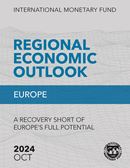This web page presents information about the work of the IMF in the Republic of Moldova, including the activities of the IMF Resident Representative Office. Additional information can be found on the Moldova and IMF country page, including IMF reports and Executive Board documents that deal with the Republic of Moldova.
At a Glance
- Current IMF membership: 191 countries
- Republic of Moldova joined the Fund in August 12, 1992
- Republic of Moldova and the IMF
- Quota: SDR 172.5 million
- The last Article IV Consultation (Country Report 2023/428) was concluded on December 7, 2023
Office Activities
-
(PDF in English, Romanian and Russian)
September 27, 2024
-
Regional Conference of Central Bank Board Members in Chișinău
September 18, 2024
-
The Republic of Moldova - the host of a high-level meeting for global financial discussions
July 11, 2024
-
VIDEO// The meeting of the International Monetary Fund and World Bank Constituency in Chisinau
July 11, 2024
-
(Romanian)
June 13, 2024
IMF’s Work on the Republic of Moldova
-
July 12, 2024
Series:Technical Assistance Report No. 2024/055
-
July 11, 2024
Series:Country Report No. 2024/208
-
June 28, 2024
The Executive Board of the International Monetary Fund (IMF) concluded the fifth review under the Extended Credit Facility (ECF) and Extended Fund Facility (EFF) , and the first review under the Resilience and Sustainability Facility (RSF) , for the Republic of Moldova.
-
June 28, 2024
The Executive Board of the International Monetary Fund (IMF) concluded the fifth review under the Extended Credit Facility (ECF) and Extended Fund Facility (EFF) , and the first review under the Resilience and Sustainability Facility (RSF) , for the Republic of Moldova.
-
Weathering Tomorrow: Climate Analogues and Adaptation Gaps in Europe
May 31, 2024
Author/Editor:Armand P Fouejieu | Shakill Hassan | Ruben V Atoyan | Yiran Zha
Series:Working Paper No. 2024/109
Regional Economic Outlook
October 24, 2024
Europe’s economy is recovering, benefiting from a strong crises’ response. Yet, the recovery is falling short of its full potential. Uncertainty about persistent core inflation, policy directions, and geopolitical conflicts, is dampening the near-term outlook. In the longer term, perennially weak productivity growth—a result of limited scale and business dynamism–-amid new headwinds from fragmentation and climate change are holding back growth potential.
Read the Report




